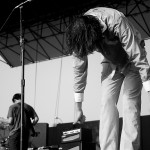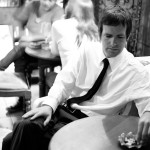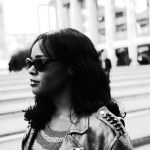
KNIVES OUT
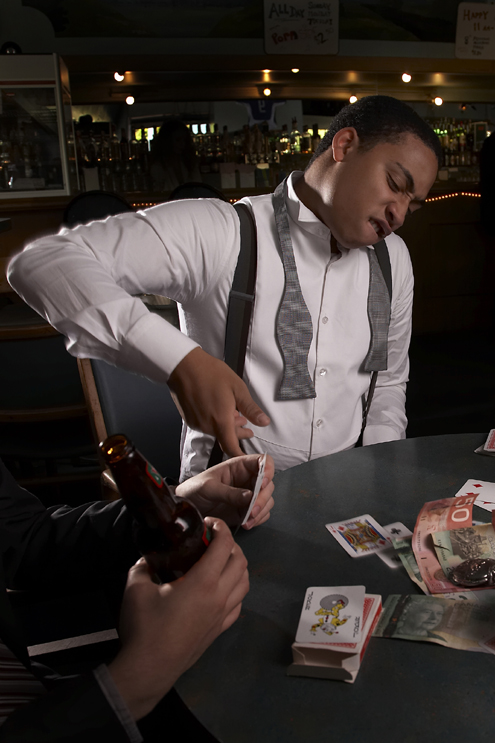
Photos by Aaron Pederson
Cadence Weapon approached his second album, Afterparty Babies (Anti-), with one of the purest goals an artist could have: the desire to meet Tina Fey. Of course, the rapper/producer also finds time to gripe about girls and dis ridiculous hipster fashion. But that’s besides the point, really.
self-titled caught up with Cadence, known to his parents as Rollie Pemberton, to talk about Canada, songwriting and his former life as a music critic.
![]()
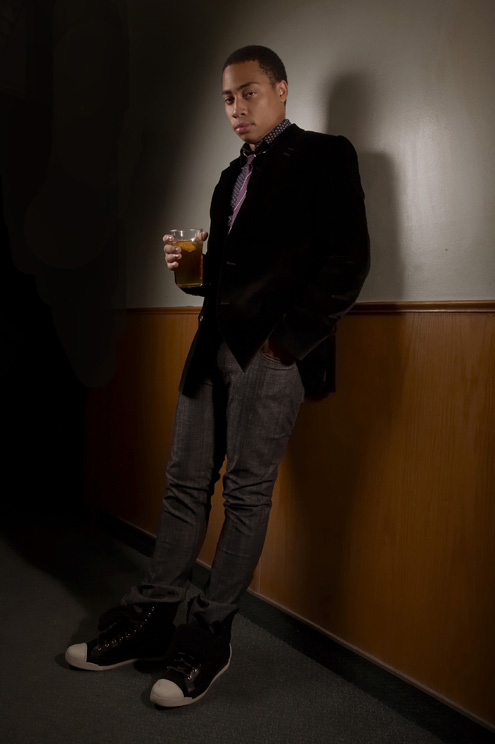
self-titled: What were you aiming for when you started making Afterparty Babies?
Initially, I was trying to make an album about the housing crisis in Alberta [Canada], but then I decided to stop doing that because it was getting kind of boring. Then I noticed all my friends started doing coke. And I decided to kind of write an album about people and why they do things and human nature and the psychology of Cadence.
Did you handle production on the album?
Yeah, I do all the production, except for one track by DJ Nato. The rest of the beats are by me.
It has an electronic club feel. Why did you decide to go for that?
I’m into that kind of music…and I got more into DJing in the past couple of years. The whole idea of dance culture really fascinated me. Every beat I made ended up being four on the floor, just sort of dance stuff.
Who are your favorite dance artists that you draw from?
I’m a big Basement Jaxx fan. I like they way their music sounds really like it’s a party happening. It sounds really organic and super-tech. Switch. Obviously Daft Punk. I’m into very European stuff. I like some of the Ed Banger stuff. Dubsided Records.
So it’s probably safe to say that it doesn’t bother you that the beats on this album are unlike anything you’re going to hear in contemporary hip-hop?
Yeah, it doesn’t really bug me. I don’t think I’ve ever been into making traditional rap, I guess. It’s not to say I don’t like any of that stuff because I do. It’s just I feel like I probably don’t really listen to a lot of rap, and the rap I listen is like D4L. I listen to, like, club rap. I like fun rap. I feel like a lot of underground rap is extremely serious and is feeling itself a little too much sometimes.
How did you go about making the first track on the album, “Do I Miss My Friends?†Are you looping your own voice?
I just did it randomly in the studio. I was like, “Hey, Nato. Record me making these sounds.†And so I sampled myself clapping and slapping my legs and humming stuff and making sounds with my mouth. I had him arrange it for me, and I wrote and recorded a song right there. It’s kind of a different way of doing things for me because usually I make the stuff pretty painstakingly at home and then bring it into the studio and polish it up a bit.
It’s like a cappella hip-hop.
Yeah, I wanted to kind of have a barbershop vibe to it.
What inspired the lyrics for that song?
That song is me thinking about the nature of friendship. I’ve been touring a lot, and I’ve been thinking, “Do I actually miss my friends? When I am on tour, do they miss me?†In the time that I was recording it and writing about it, I’d had this summer were I was sitting around and hanging out with people a lot and playing video games and going to the bar, just wondering, “What am I doing with these people? Why these people? Why are these people my friends?â€
“Real Estate” (on MTV Live)
[youtube=http://www.youtube.com/watch?v=9jHSHTkRzZ8]
What was the inspiration behind the song “Real Estate�
My dad was a real estate agent and a DJ. A part-time real estate agent. And the idea of real estate fascinates me. I think there’s a major parallel between that and battle rap. Like the idea of being number one in the city, like the idea that you’ve got my face on a bench, and it’s like, “I’m the number-one real estate agent; I have the most houses in this area.†It’s just a long extended metaphor about the rap industry and different areas of rap. For instance, I’ll be talking about brownstones’ floors being the opposite of west; that’s talking about Brooklyn and how down South it’s OK to have gold in your mouth, just talking about the dichotomy of rap and how people care so much about doing certain things and certain places.
So, switching gears, how long have you been rapping for?
I’ve been rapping since I was thirteen. So I guess, nine years.
You grew up in Canada. What was the hip-hop scene like there?
It wasn’t really extensive. Growing up, I didn’t really know anybody who rapped, which I guess made it easier for me to do something original. It made it a lot easier for me to do something that hadn’t been done before because I had no basis other than the records I listened to. I grew up on a lot of cerebral underground rap, like Raz Caz.
You mentioned that your dad was a DJ, and I’ve read that he was one of the first Canadian hip-hop radio DJs.
Yeah, he was the first guy who ever played rap and funk and stuff in Edmonton.
Did you two bond over the music?
Not really. I mean, I definitely heard it a lot around the house. I don’t know. It was more like I would get the stuff he didn’t like. He would give me CDs that he didn’t want to listen to, and I would be watching Nirvana on TV. I was basically trying to avoid music he would play. But as I got older, I started realized my parents actually had great music taste.
When you’re young, you never want to listen to what your dad listens to.
My dad’s like, “Oh, what is this Eminem? I’m going to throw this away. Do you want it?†And I’m like, “OK, I’ll listen to it.â€
Really? Your dad gave you a copy of Eminem?
Yeah, he was weird about some of the mainstream stuff. He liked more Brand Nubian, like Afrocentric, funky stuff more than anything. When he saw Eminem, he was like… You know how you get so many promos that you think, “This has got to be shitty?†But I loved it.
As you went along, how did you get further into your own style of rap?
It’s like I started from a battle perspective, more into freestyling and battling people and talking about how good I was at rapping. But I got way more fascinated by the ideas behind everything you’re saying. I try to make everything I say meaningful in some way.
What’s the state of the Canadian hip-hop scene now? Do you feel connected to it now that you are on tour all the time?
I never really felt connected to the indie-rap scene. There’s some rappers I identified with. Peanuts & Corn crew I love, but I don’t feel any more alienated than I’ve ever been because I’m on tour. I call [what I’m doing] “folks rap†because it’s raps about folks. It’s not like I’m going to have a posse or something; it’s not like I’m going to have a crew of people who all identify with the same principals I do because I think that’d be too hard.
You mention this a lot on the album. You talk about hipster rap and underground rap being played out. Where do you think you fit in the larger scheme of hip-hop?
I like to think I’m approaching the same things as Madlib or Fracture…the idea of open-ended sampling, just breaking structure. I don’t think I’m a hipster rapper, per se. I guess I’m a rapper that is a hipster. I’m not like Spank Rock or whatever, but I do like Spank Rock. I don’t know where I fit in, really. I’m nowhere man.
When you were eighteen, you left school to pursue hip-hop full time. Why did you decide just to dive right in?
I really hated journalism school. I went to school in Virginia, and it was so stifling. So I decided to bounce and try and put out some shit, and it actually worked, completely. People responded to it almost immediately. I was pretty lucky, I guess. I mean, honestly, I figured I could always go back if it didn’t work out, and I felt pretty confident about what I was doing, that it was original enough that people would want to listen to it.
“In Search of the Youth Crew”
[youtube=http://www.youtube.com/watch?v=bziT0kkkSgw]
You used to write for Pitchfork, and they reviewed you the other day. As a former music critic, is it strange when other people review your work?
It is really weird because I feel like some of these people make mistakes or don’t really know what I’m talking about. I know I’m due for some negative reviews, just from the reviews I’ve given. It is really weird….Misspelling the album, songs and not understanding exactly what I’m doing is kind of frustrating because you don’t have control. You lose control of a record when you put it out. You lose control over everything about it.
Has there ever been an artist whose work you’ve slammed that you later ran into while touring who asked, “Why’d you give me that review?â€
No, I haven’t done shows with someone who’s like, “Hey, you gave me a shitty review. I hate you.†But one example I would say is RJD2’s second record, Since We Last Spoke. Man, I first really thought it was totally pretentious. I thought it was wack as hell. And then I started listening to it more and more over the span of the year, and it ended up in my Top 10 for Pazz and Jop for the Village Voice, which was kind of weird, but that’s one of the only records I’ve ever changed opinions on so drastically.
I was doing a piece on the rapper Murs, and I found an old Pitchfork review that you wrote about him. I thought, “OK, it’s an 8. Cadence can still play the Paid Dues Festival.â€
Yeah, I don’t think these people even remember. One example is Atmosphere–Slug. I reviewed a couple of his most recent albums. I like Atmosphere, the earlier stuff, a lot. I love Overcast; I love Lucy Ford. I think those albums are classic. But I just think those last couple of ones were just like, OK. I ended up interviewing him kinda recently, like a year ago, and he was like, “Oh, Rollie Pemberton, I fucking know you. You gave me a couple of shitty reviews. You hate this shit. Why are you interviewing me?†But I really like him, and I wanted people to go to the show.
One thing that made me laugh out loud while listening to your album was that you complain about nightclubs that still play Le Tigre’s “Deceptacon.â€
Yes, yes, exactly! Thank you for understanding what I mean!
Don’t get me wrong, I like that song…
I like that song a lot, too! But oh, my god, they’ve ruined it! It’s not even music anymore. It’s like somebody playing “Happy Birthday†at a DJ party. It’s redundant. It’s kinda like–I think it’s funny–Justice’s “D.A.N.C.E.,†like, “Yeah, let’s dance to this song ‘D.A.N.C.E.’†Are you kidding me? Oh, man, my song [“Unsuccessful Club Nightsâ€] is about DJ culture and just how people need to get more creative. Everybody plays the same shit that Diplo plays. I just feel people need to have their own identity, if that’s even possible.
You talk about stuff that I’ve never heard any rapper talk about, like watching The Wire while not being featured in Wire Magazine or “Fey like Tina.†I’ve heard rappers talk about some crazy stuff, but that’s gotta be a first.
Yeah, I guess so. I guess I’m kind of a weird guy. I’m just fascinated by pop culture, and the whole point of that album, I guess, was to analyze the social structure, analyze the world today. I wanted to do a time capsule of what was going on right now in every way possible. So I guess that’s why I ended up talking about Tina Fey, or maybe it’s just because I’m in love with her. I just had to give her a shout out. Maybe I’m just trying to get her to Google [me], and then we can hang out.
That’s a noble goal.
Maybe that’s it.
Speaking of pop-culture references, I have to say, the joke about “I hang with the idiot like my name was Ian Curtis  Come on! That’s terrible. [Ed: It is widely believed that Joy Division singer Ian Curtis was listening to Iggy Pop’s The Idiot as he committed suicide.]
I guess. I thought it was funny.
Well, yeah, it was funny.
I jammed that album so much. That’s one of my favorite albums, The Idiot. Perhaps if he hadn’t decided to hang himself to that album, perhaps I would have never heard it, so I guess something good came out of that.
Something good.
Something good.
MP3: Rick Ross vs. Simian Mobile Disco, “Hustlin’ Hustler” (Cadence Weapon Hi-Speed Edit)
MP3: Ghostface Killah, “Save Me Dear” (Cadence Weapon AceRock Remix)
MP3: “Sharks”
MP3: “Black Hand”
